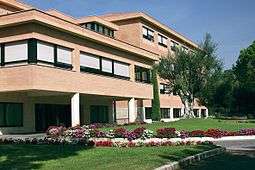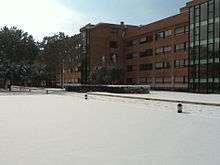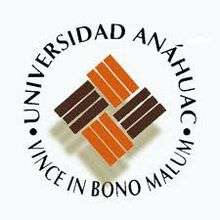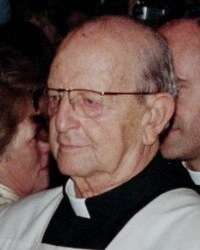Legionaries of Christ
The Legion of Christ (LC) is a Roman Catholic religious institute established by Marcial Maciel and made up of priests and candidates for the priesthood. It forms part of the Regnum Christi Federation, founded by Maciel in 1959, which includes the Legionaries of Christ, the Society of Apostolic Life of the Consecrated Women of Regnum Christi, the Society of Apostolic Life of the Lay Consecrated Men of Regnum Christi, and other Catholics who associate individually.[1]
 | |
| Abbreviation | LC |
|---|---|
| Motto | Adveniat Regnum Tuum |
| Founded | January 3, 1941 |
| Type | Clerical Religious Congregation of Pontifical Right (for Men) |
| Headquarters | Via Aurelia 677, 00165 Roma, Italy |
| Location |
|
Membership | 1,455 members (970 priests) (2019) |
General Director | Fr. John Connor, LC |
Papal Assistant | Fr. Gianfranco Ghirlanda, SJ |
Key people | Marcial Maciel - Founder
Álvaro Corcuera - Second General Director Velasio de Paolis - Papal Delegate from 2010-2014 |
Main organ | General Council |
| Website | www.legionofchrist.org |
The Legion was founded in Mexico in 1941, by Marcial Maciel. As its general director, he directed the congregation until forced to step down in January 2005 as a result of grave sexual scandals against children.[2]
The Legion of Christ has religious communities in 21 countries. As of the end of 2019, its members included four bishops, 970 priests and 481 seminarians (not including minor seminarians).[3] In the U.S. the Legion and Regnum Christi operate five schools (and assist at several others),[4] as well as provide spiritual direction, retreats, and formation programs for both children and adults.
In 2006, Maciel was investigated by the Holy See and suspended from his ministry, initially over breaches of celibacy. This followed public revelations that he had sexually abused minors, which were later confirmed.[5] The Legion's additional vow of "charity" had been used to induce secrecy, promising not to criticize superiors. This was lifted by Pope Benedict XVI in December 2007.[6] Since then, Legionaries have been learning to "freely debate" how their congregation is governed,[7] and by 2019 a more collegial form of central government had been established.[8] Despite all this, Maciel was never defrocked.[9] Maciel died in Jacksonville, Florida, on January 30, 2008, aged 87, and was buried in his hometown of Cotija de la Paz, Michoacán, Mexico.
After Maciel's death, and following more revelations, Pope Benedict XVI ordered an apostolic visitation in 2009. At the conclusion of the visitation, Cardinal Velasio De Paolis was delegated to examine the Legionaries' constitutions and conduct a visitation of its lay affiliate Regnum Christi. On October 19, 2012, De Paolis published a cover letter for a summary of the Regnum Christi's charism which he had approved as a working document.[10]
The Legion completed a five-year renewal process that included a revision of its constitutions, which were approved during an extraordinary general chapter. On 4 November 2014, after an extensive process of the reform of the Legionaries of Christ, the Vatican approved the congregation's amended constitutions.[11]
After its scandals, the Legion has had a few priests and seminarians leave. Some centers of formation and apostolates have also closed. In December 2019, the organization accepted responsibility for 175 cases of child sexual abuse by 33 priests, including 60 minors who were abused by Marcial Maciel.[12] However, Archbishop Rogelio Cabrera López, head of the Episcopal Conference of Mexico, said on December 22, 2019 that the report is "late and incomplete": "¿Cómo es posible que 70 años cometiendo delitos el fundador y nadie levantara la voz?", ("How is it possible that the founder committed crimes for 70 years and no one ever said anything?")[13]
In an address directed to Legionaries during their General Chapter of 2020 and to the General Assemblies of Regnum Christi held during the same period, Pope Francis recognized the progress made in their renewal saying: "The new Constitutions and the new Statutes are truly 'new,' be it because they reflect a new spirit and a new vision of religious life, consistent with Vatican Council II and the directions of the Holy See, be it because they are the product of a three-year endeavor, in which all your communities were involved and which has led to a change in mentality."[14]
Ethos
Members of the Legion take vows of humility, poverty, chastity, and obedience.
Love for Christ is, for Legionaries, a personal experience. Through the Gospel, the cross, and the Eucharist, Legionaries come to know Christ intimately, and love him in a passionate way by embracing him as their model of holiness.[15] Their spirituality is Christ-centered with a particular emphasis on the Sacred Heart in their vocation as religious and priests.[16]
Love for Mary flows from imitating Christ; the Blessed Virgin is loved as both Mother of the Church and of the individual Legionary's vocation. Legionaries consecrate their spiritual and apostolic lives to her care, and seek to take on her virtues of faith, hope, charity, obedience to God, humility, and cooperation with Christ's plan of redemption and justice.[15]
Love for Souls is expressed in an ardent desire to spread Christ's kingdom in this world. Legionaries try to use every moment of their time to help the greatest number of souls know and love Christ. For a legionary, time is a gift given by God which he wants to maximize to spread the Gospel and help bring the love of God to many souls.[15]
Formation



The Legion presents itself as dedicated to advancing the Church's mission in the world, and to this end claims to submit candidates to a rigorous formation of four dimensions: human, spiritual, intellectual and apostolic. Critics accused the Legion of producing priests and religious who all spoke and behaved in the same way. The Legion's defenders argued that, just as members of a family receive similar upbringing, so the members of the Legion were formed in like ways, but still respected the freedom of the individual. The new constitutions approved by Pope Francis present a more balanced approach to the formation of members.[17]
As is the practice in many religious congregations of the Roman Catholic Church, Legionaries may visit their family according to their superiors' discretion and the norms of the Congregation, the average being for about 4–7 days a year not counting special occasions. Regular contact with their families is encouraged with respect to written, verbal, and video communication.
Apostolates

The apostolate of the Legionaries has many aspects, but focuses on the following:[18]
- Education and teaching at all levels.
- Pastoral attention to youth and families.
- Catechesis and preaching of retreats and spiritual exercises.
- Evangelization and mission work (especially in the Mexican State of Quintana Roo in the Yucatán Peninsula).
- Attention to the underprivileged, especially those groups that undergo the greatest spiritual, moral or material privation.
- Works of Christian charity and mercy.
- Supporting bishops in the formation of diocesan seminarians and in the ongoing formation of their priests.
- Spiritual attention to Regnum Christi members and accompanying them in their formation.
In the US, the congregation runs four schools. In 2012, all three of its high schools (Everest Collegiate High School, The Highlands School and Pinecrest Academy) were named in the list of top 50 Catholic High Schools developed by the Cardinal Newman Society, a Catholic group dedicated to promoting the teaching of Pope John Paul II in his 1990 Apostolic Constitution Ex Corde Ecclesiae.[19]
In Mexico, the Legionaries administer the Anahuac University Network. Legionaries operate centers of education (minor seminaries, seminaries, schools and/or universities) in Mexico, Venezuela, Colombia, Brazil, Korea, Ireland, Spain, Italy, France, Germany, the United States, and Canada.
In 2006, the Legion launched a test phase of Mission Network in the United States. Catholic Mission Network, Inc., is the umbrella organization which oversees and approves Legionary-endorsed apostolates that are not stand-alone like a school or retreat center. Its purpose is to provide both 1) structure and supervision of the apostolates, and 2) An overview as to what the Legion/Regnum Christi does as a whole, with brand-name-type recognition.[20]
The youth wing of Regnum Christi, offering spirituality for youth 11 to 16, is called ECYD. The commitments in ECYD vary over time, adapting to the ages of the members.[21] Many ECYD members are involved in clubs run or overseen by Legionaries or consecrated members of Regnum Christi.
Founder

Marcial Maciel was born in Cotija, Michoacán on March 10, 1920, into a devout Catholic family during a time in which the Mexican government was fiercely anticlerical. He became a priest after a troubled youth.[22] Maciel was expelled from two seminaries for reasons that have never been explained. He became a priest only when one of his uncles ordained him after private studies.[23] The Legion began in Mexico where its largest base remains. Houses of formation were established in Spain and Italy within its first decade. In the 1960s, chapters of the organization were founded in Ireland and then in the United States. In the 1970s and 80s the congregation expanded throughout Latin America. In the 90s it expanded to France and Central Europe.[24]
Abuses
After years of denial by the Congregation and the Regnum Christi movement and dismissal of accusations made by many former members, an investigation prompted by the Vatican concluded that allegations of sexual abuse of minors by Fr. Maciel were true. The superiors of the congregation did not officially inform the rest of the congregation until a year after his death, during which time, they continued to permit an internal culture of revering him as a saint. When the information was leaked to the press, the Legion was pressured into making a statement on the matter.
Long after the Rev. Marcial Maciel Degollado 2008 death, the Legionaries of Christ eventually acknowledged their founder's "reprehensible and objectively immoral behavior" as head of the order from its founding in 1941 until Pope Benedict XVI removed him from active ministry in 2006.[25] As a result of the scandal, Pope Benedict XVI also removed the vows of 'charity and humility' which required members to maintain secrecy, impermeability, and refrain from criticism of superiors.[6] Despite these actions, Pope Benedict XVI never defrocked Maciel.[9]
After the sexual scandals of Maciel came to light, some priests and seminarians left the congregation. Several schools and centers of formation closed.
In November 2019, the organization admitted that Father Fernando Martínez Suarez had abused eight minors between 1990 and 1993.[26] A month later, they admitted that members of the organization had sexually abused 175 children between 1941 and 2019. 60 of those were abused by its founder, some of whom were his own children from several relations. Six of the priests have died, eight have left the priesthood, one left the Congregation, and 18 continue in their posts.[27]
On December 21, 2019, the Legion of Christ acknowledged the abuse and also signaled out former Secretariat of State Angelo Sodano for leading efforts to cover up the reports of abuse.[28][29][30]
Renewal
The Legion underwent a visitation by the Vatican and a process of renewal through a series of discussions revolving around the charism of the movement, the relationship of the congregation to the lay movement, and the place of both within the Church. The entire congregation revised the Constitutional document under the direction of a central committee and presented a final version to the new Pope Francis. Under the guidance of Cardinal Velasio De Paolis, the congregation announced the order's Extraordinary General Chapter in Rome in January 2014, for a "total restructuring". Apologies to the victims were issued and a compensation commission established.[32] In 2019, new statutes were adopted introducing collegial leadership and more transparent community life to prevent possible abuses in the future.[33]
In an address directed to Legionaries during their General Chapter of 2020 and to the General Assemblies of Regnum Christi held during the same period, Pope Francis recognized the progress made in their renewal saying: "The new Constitutions and the new Statutes are truly 'new,' be it because they reflect a new spirit and a new vision of religious life, consistent with Vatican Council II and the directions of the Holy See, be it because they are the product of a three-year endeavor, in which all your communities were involved and which has led to a change in mentality."[14]
See also
- Regnum Christi
- ECYD
- Regnum Christi Consecrated Women
- Regnum Christi Consecrated Men
- Controversies surrounding the Legion of Christ
References
- "Statues of the Regnum Christi Federation, 2019" (PDF). Regnum Christi. Retrieved 29 April 2020.
- Philip Pullella, Legionaries founder sexually abused 60 boys, religious order's report says, Reuters, December 21, 2019
- "Statistics of the Legion of Christ as of December 31, 2016". regnumchristi.org. Regnum Christi. Retrieved 2 September 2017.
- "RC Education Schools in North America". rceducation.org. RC Education. Retrieved 2 September 2017.
- Povoledo, Elisabetta (May 11, 2012). "Vatican Inquiry Reflects Wider Focus on Legion of Christ". The New York Times. Retrieved 2012-05-11.
- Bernardo Barranco V. (12 Dec 2007). "La derogación de los votos secretos de los Legionarios - La Jornada" [The repeal of the secret votes of the Legionaries]. www.jornada.com.mx. Retrieved 22 December 2019.
- "Legionaries of Christ elect new leaders – CatholicHerald.co.uk". Retrieved 30 November 2016.
- NULL (2020-03-01). "Pope Francis Sends Message to Legionaries of Christ, Regnum Christi". ZENIT - English. Retrieved 2020-05-04.
- Donadio, Rachel (March 26, 2010). "Catholic Order Admits Its Founder Abused Boys Over Decades" – via NYTimes.com.
- "letter of Velasio De Paolis to the Legionaries of Christ and members of Regnum Christi" (PDF). Regnum Christi. Retrieved 27 October 2012.
- "Vatican approves amended constitutions for Legionaries of Christ". 3 November 2014. Retrieved 30 November 2016.
- "Informe 1941-2019" (PDF). 2020-05-04.
- "Informe de legionarios, tardío e incompleto, considera la CEM" [Report of legionaries, late and incomplete, CEM considers], Proceso (in Spanish), Dec 23, 2019
- "Pope Francis Sends Message to Legionaries of Christ, Regnum Christi". 2020-05-04.
- Spirituality - Legion of Christ Archived 2011-10-15 at the Wayback Machine
- "Spirituality". Legionaries of Christ. Retrieved 2020-04-29.
- ANDREA GAGLIARDICCI (Nov 2, 2014). "Pope Francis Approves New Constitutions for the Legion of Christ". National Catholic Register.
- See the Legionaries' Archived 2011-08-14 at the Wayback Machine
- Article on their own site: Among the Top 50 Archived 2013-12-13 at the Wayback Machine List:Nation’s Top 50 Catholic High Schools Announced Archived 2012-09-22 at the Wayback Machine. For the Apostolic Constitution, see the Vatican website
- Mission Youth USA - Mission Network and Regnum Christi Archived 2012-03-26 at the Wayback Machine
- "ECYD - Regnum Christi". Archived from the original on 2016-12-01. Retrieved 30 November 2016.
- "Analysis: Legion of Christ Founder leaves a flawed legacy". Docs.google.com. Retrieved 2010-09-19.
- Berry, Jason (2008-02-22). "Fr. Marcial Maciel leaves behind a flawed legacy | National Catholic Reporter | Find Articles at BNET". Findarticles.com. Archived from the original on 2016-01-08. Retrieved 2010-09-19.
- "Who we are". Legion of Christ. Retrieved 20 April 2013.
- "Legionaries of Christ Denounce Founder, Marcial Maciel Degollado". The New York Times. 7 February 2014. Retrieved 30 November 2016.
- Ana Langner (Nov 22, 2019), "Aceptan Legionarios que Fernando Martínez abusó de 8 niños en los 90" [Legionaires agree that Fernando Martinez abused 8 children in the 1990s], La Jornada (in Spanish)
- https://apnews.com/e23d4e965a0b84cad18bef11d9b5d825
- https://www.irishtimes.com/news/social-affairs/religion-and-beliefs/cardinal-92-who-sought-deal-to-bury-sex-abuse-documents-resigns-1.4122879
- https://cruxnow.com/vatican/2019/12/cardinal-tainted-by-abuse-scandals-steps-down-as-dean-pope-sets-term-limit/
- "Money paved way for Maciel's influence in the Vatican". 6 April 2010. Retrieved 30 November 2016.
- Legion of Christ reiterates commitment to Maciel's victims, Catholic News Agency
- Céline Hoyeau, Regnum Christi Movement, Legionaries of Christ revamped: Changes and safeguards in new statutes in the wake of sexual abuse by its founder Marcial Maciel, LA CROIX International, June 17, 2019
Further reading
- Berry, Jason and Renner, Gerald. 2004. Vows of Silence: The Abuse of Power in the Papacy of John Paul II. Free Press. ISBN 0-7432-4441-9
- Conde, Angeles and David Murray: The Legion of Christ: A History Circle Press, 2004. ISBN 0-9743661-2-9
- Maciel, Marcial. Christ Is My Life (Sophia Institute Press: 2003) ISBN 1-928832-97-0
- Maciel, Marcial. Integral Formation of Catholic Priests (Alba House, 1992) ISBN 0-8189-0629-4
External links
| Wikimedia Commons has media related to Legion of Christ. |
